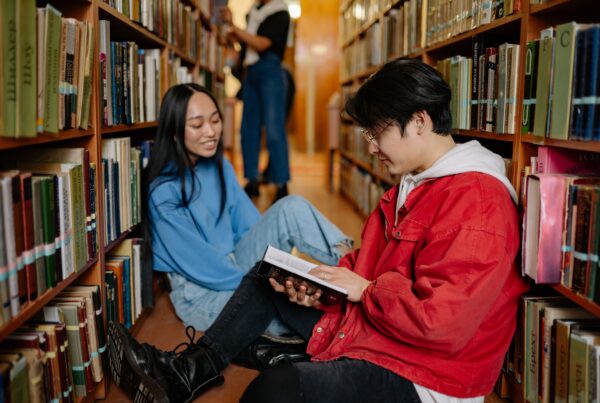
With the closing of the UvA in March, students had to decide whether they would stay in Amsterdam or temporarily move back home. Those who opted to move back in with their families suddenly found themselves in their teenage bedrooms after months or years of living alone. How did those students experience moving back? Did any conflicts arise? To find an answer, Spiegeloog interviewed three psychology students who (temporarily) moved back home.
With the closing of the UvA in March, students had to decide whether they would stay in Amsterdam or temporarily move back home. Those who opted to move back in with their families suddenly found themselves in their teenage bedrooms after months or years of living alone. How did those students experience moving back? Did any conflicts arise? To find an answer, Spiegeloog interviewed three psychology students who (temporarily) moved back home.
Were there any conflicts you encountered living and studying at home?
Martin: ‘Moving back meant that my parents and I had to adjust to each other’s lifestyles. While living on your own provides you with the freedom to do whatever you want, being back home made me feel like a kid again. But in the bad sense, for example you keep getting told what to do and when to do it. Sort of a loss of individualistic freedom. But as my parents usually worked throughout the day, I was able to manage my days quite freely except the daily lunch at my grandparents.’
Joyce: ‘I always assumed Dutch students had it easier in university as they didn’t have to get used to an entirely different culture, figure out a foreign education system and build a new support network. However, moving back home I realised that Dutch students living at home weren’t really in a more privileged position than international students. Being home is great because you are taken care of but you are also faced with a lot of distractions. Having your own flat in Amsterdam means that you can shut the door and fully focus on yourself or your studies. However, being back home, you don’t have that option. My parents frequently enter my room, asking if I want fruit or to join them for a movie. This can be really distracting and makes it difficult to have a healthy work-life balance.’

Joyce (third-year student, Hong Kong)
Did your parents understand your situation?
Martin: ‘Luckily, my parents understand what it meant to be a student and the difficulties of moving back home after living on your own. My mom herself had studied away from home so she knew what it meant to be back after a long period of absence. For my dad, he understood my situation from his individualistic perspective.’
Joyce: ‘My dad is working in academia himself and as a professor, he fully understands my need to study and supports me whenever he can. We also have a housekeeper so luckily
I wasn’t expected to do any chores around the house. Additionally, as life is nearly back to normal in Hong Kong, I am now able to study in the library again and arrange my day more independently.’

Martin (third-year student, Croatia)
What’s next?
Martin: ‘As I am an only child and my parents work during the day, I barely had any distractions when it came to online learning or exams. However, despite being able to concentrate on my studies at home, I am now back in Amsterdam and enjoy being independent again.’
Joyce: ‘I will continue living at home in the second semester. If I am honest, it is nice that I can fully focus on my studies without having to worry about doing the laundry or groceries. Also, it is great that I am able to ask my dad questions about my papers. Due to the time difference, that wasn’t really an option before. However, despite the advantages of living and studying at home, I do think I was more productive in Amsterdam.’
Were there any conflicts you encountered living and studying at home?
Martin: ‘Moving back meant that my parents and I had to adjust to each other’s lifestyles. While living on your own provides you with the freedom to do whatever you want, being back home made me feel like a kid again. But in the bad sense, for example you keep getting told what to do and when to do it. Sort of a loss of individualistic freedom. But as my parents usually worked throughout the day, I was able to manage my days quite freely except the daily lunch at my grandparents.’.
Joyce: ‘I always assumed Dutch students had it easier in university as they didn’t have to get used to an entirely different culture, figure out a foreign education system and build a new support network. However, moving back home I realised that Dutch students living at home weren’t really in a more privileged position than international students. Being home is great because you are taken care of but you are also faced with a lot of distractions. Having your own flat in Amsterdam means that you can shut the door and fully focus on yourself or your studies. However, being back home, you don’t have that option. My parents frequently enter my room, asking if I want fruit or to join them for a movie. This can be really distracting and makes it difficult to have a healthy work-life balance.’

Joyce (third-year student, Hong Kong)
Did your parents understand your situation?
Martin: ‘Luckily, my parents understand what it meant to be a student and the difficulties of moving back home after living on your own. My mom herself had studied away from home so she knew what it meant to be back after a long period of absence. For my dad, he understood my situation from his individualistic perspective.’
Joyce: ‘My dad is working in academia himself and as a professor, he fully understands my need to study and supports me whenever he can. We also have a housekeeper so luckily
I wasn’t expected to do any chores around the house. Additionally, as life is nearly back to normal in Hong Kong, I am now able to study in the library again and arrange my day more independently.’

Martin (third-year student, Croatia)
What’s next?
Martin: ‘As I am an only child and my parents work during the day, I barely had any distractions when it came to online learning or exams. However, despite being able to concentrate on my studies at home, I am now back in Amsterdam and enjoy being independent again.’
Joyce: ‘I will continue living at home in the second semester. If I am honest, it is nice that I can fully focus on my studies without having to worry about doing the laundry or groceries. Also, it is great that I am able to ask my dad questions about my papers. Due to the time difference, that wasn’t really an option before. However, despite the advantages of living and studying at home, I do think I was more productive in Amsterdam.’



